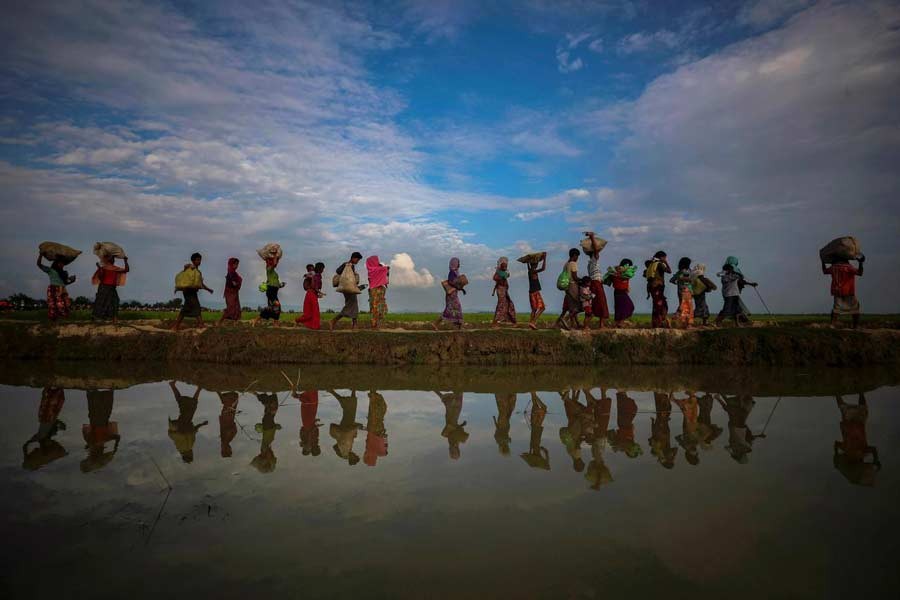Myanmar officials visited camps for Rohingya Muslim refugees in Bangladesh on Wednesday in an effort to kick-start a process to repatriate hundreds of thousands who fled an army crackdown last year.
More than 700,000 Rohingya refugees crossed into Bangladesh from western Myanmar, UN agencies say, after Rohingya insurgent attacks on Myanmar security forces in August 2017 triggered a sweeping military response.
Officials said after meetings in Dhaka on Tuesday returns would begin next month, but the UN refugee agency said conditions in Rakhine state were “not yet conducive for returns”.
The agency had completed the second phase of assessment in Rakhine, but its access remained “limited”, UNHCR spokesman Andrej Mahecic said in Geneva on Wednesday.
Rohingya and other Muslims in three townships suffer hardship and economic vulnerability due to restrictions on their movement and the prevailing sentiment is “fear and mistrust”, he said.
A group of about 60 Rohingya community leaders met a delegation of about a dozen Myanmar officials in the Kutupalong camp, the largest refugee settlement in the world in Bangladesh’s Cox’s Bazaar district, said two Rohingya men who were present.
Myanmar says it has been ready to accept back the refugees since January, and has built camps near the border to receive them.
Myint Thu, permanent secretary at Myanmar’s Ministry of Foreign Affairs and leader of the Myanmar delegation, said Myanmar had verified about 5,000 names of refugees and that repatriation would begin with a first batch of 2,000 returnees in mid-November.
“We are here to meet with the people from the camps so that I can explain what we have prepared for their return and then I can listen to their voices,” he told reporters in Cox’s Bazaar.
Bangladesh handed over an additional list of more than 22,000 Rohingya refugees to be verified by Myanmar, Relief and Repatriation Commissioner Abul Kalam told Reuters.
First step to citizenship?
Rohingya leaders said after Wednesday’s meeting that they were unconvinced about the proposed repatriation.
“They told us we don’t have to stay (in a camp) for long, but when we asked for how many days they could not say,” said Mohib Ullah, an influential organiser in the camps, reflecting what the officials said.
Mohib Ullah said Rohingya leaders wanted Myanmar to recognise them as an ethnic group with the right to Myanmar citizenship before they return.
Myanmar does not consider the Rohingya a native ethnic group. Many in the Buddhist-majority country call the Rohingyas “Bengalis”, suggesting they belong in Bangladesh.
A pamphlet given to refugees by Myanmar officials on Wednesday, seen by Reuters, encourages them to accept new identity cards as a “first step” to citizenship. Many Rohingyas reject the cards, which they say treat them as foreigners.
Those with “national verifications cards” - known as NVCs - would be guaranteed “socio-economic development”, but those without will be “stateless”, the pamphlet says.
“When we asked about our citizenship there was no answer,” said Abdur Rahim, another Rohingya at the meeting. “They told us to accept NVCs. We are not accepting NVCs. We are not Bengali.”
The Rohingya leaders handed over a letter to Myanmar leader Aung San Suu Kyi setting out their demands, including “compensation and reparations” for violence committed against Rohingyas.
UN rights investigators said in August that Myanmar’s military acted with “genocidal intent” in the crackdown last year.
The administration of Nobel laureate Suu Kyi has denied most of the allegations, arguing it was a legitimate response to quell “terrorism”.
China, which has provided diplomatic cover to Myanmar over the exodus, has brokered talks with Bangladesh aimed at speeding up repatriation.
According to Reuters news agency, western countries and the United Nations, while calling for accountability for abuses committed by the military, have stressed that any returns must be voluntary.
The repatriation faces resistance from Rakhine Buddhists who make up the majority in western Myanmar’s Rakhine state, which the Rohingyas also consider their homeland.
Than Tun, a Rakhine community leader, said those who return should be confined to a part of the Maungdaw area close to the border and not allowed to resettle in some formerly Muslim-majority areas.
“We Rakhine don’t want them to come back at all, but we understand there’s international pressure,” he said, adding anyone who does return should be placed in “certain secure locations”.


